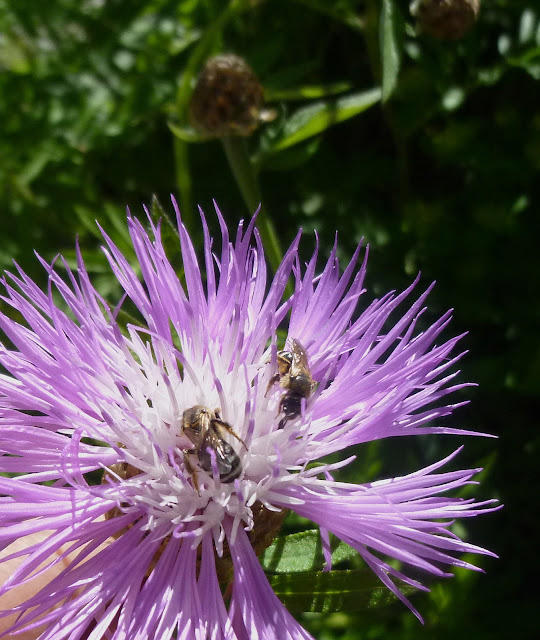Ten Reasons You Should Grow a Bee
Garden:
by Lori Weidenhammer aka Madame Beespeaker
Whether you call it an insectory, a
pollinator garden, or a bee garden, plants rich in nectar, pollen,
and essential oils will sustain a healthy pollinator population that
will benefit your household and the community you belong to.
1) Human survival depends on plant
survival which depends on insect survival. Biodiversity of plant base
and insect supports a healthy ecosystem. As humans on this planet, we
have the responsibility to be informed and responsible stewards of
the plants that sustain us. Plants keep our planet breathing. Plants
feed us. Plants heal us. Bee gardens give our children a future.
2) Urban sprawl is eating up blossom
space, and must be countered by a movement to create blossom density.
Our cities need radical gardeners and bee advocates who make sure
that space is left for pollinator habitat in cities and towns. Bee
gardens are political.
3) The movement towards growing and
eating locally depends on bees and other pollinators for its success.
Bee gardens preserve food security.
4) Including native pollinator plants
in your garden helps preserve biodiversity and keeps the knowledge of
working with what grows best in your climate. Bee gardens create and
preserve a literacy of local knowledge and local ethnobotanical
traditions.
5) Industrial agriculture is creating
an environment that is hostile and even toxic to pollinators,
threatening the future of our planet. In growing organic bee gardens,
insectaries, and pollinator corridors, the health of our planet rests
on our organic farmers and gardeners. Bee gardens are an essential
part of sustainable agricultural practise.
6) Meliferous plants come from a long
cultural tradition and heritage of the relationship between humans
and honeybees. Many of us have a lineage of beekeepers in our family
traditions which can be passed down from generation to generation,
deepening the tradition and culture of organic beekeeping. Bee
gardens are a rich part of our cultural heritage.
7) The culture of bee gardening could
in itself be a huge growth industry, with nurseries carrying and
identifying bee plants and gardeners gaining employment replacing
lawns with pollinator plants and creating biodiverse hedgerows and
pollinator borders. Bee gardens are a viable economic industry.
8) Waterwise perennial bee gardens
potentially use less inputs than lawn and vanity gardens--including
weeding, watering, and fertilizing. Bee gardens are an integral part
permaculture.
9) Bee gardens can provide a healing
oasis and sensuous retreat for the benefits of health for humans and
animals. Insectaries stimulate our senses and inspire the poet,
artist, and spiritualist inside us all. Bee gardens are good for the
soul.
10) Bee gardens give everyone a chance
to observe bees and learn about their behavior. Scientists can study
the relationship of bees to plants to help optimize the choices we
make when we plant our life-sustaining bee gardens. Bee watching
could become a popular hobby, much in the same way that bird watching
has become a lucrative industry. Bee watching could create an
interest and passion in a child that leads them to a career choice:
entomology, horticulture, chemistry, psychology, agriculture,
ecology, etc. Bee gardens engage, educate and enlighten.


No comments:
Post a Comment